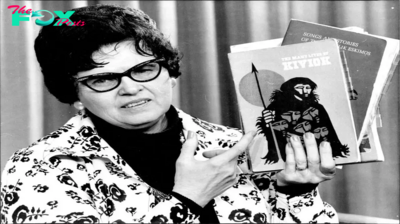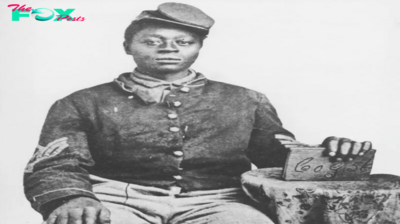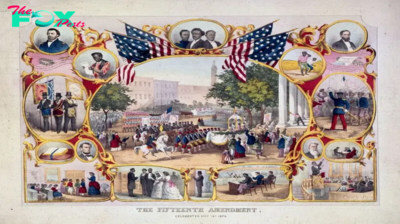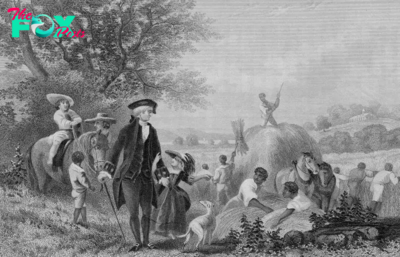History
How the Identity of the Only Black Woman to Serve in the U.S. Army in World War I Was Just Discovered
African-American heroines are everywhere in U.S. history — though they were often unseen by contemporaries. Sometimes, they simply hid.
Juneteenth is a fitting occasion to celebrate one woman who did just that: Renee Messelin was a member of the first unit of American women soldiers who served in World War I. Yet her full identity remained hidden until just last week, more than a century after she served.
In a famous photograph taken outdoors in Paris in March 1918, Messelin sits to the left of two other uniformed women and stares straight ahead. Thirty women soldiers stand behind them, many with eyes riveted skyward for incoming artillery. They had been bombarded the night before.
While the photo has long been famous, no one knew at the time that Messelin was Black. Instead, she hid her race, knowing that the Army would not accept Black women. Her deception reveals the lengths to which some citizens went to serve their nation at a time when women couldn’t vote and Jim Crow robbed Black Americans of the rights won after the Civil War.
When the head of the American Expeditionary Forces arrived in Paris in 1917, he discovered that trained men needed a full minute to patch through a telephone call, so he cabled Washington. “On account of the great difficulty of obtaining properly qualified men, request organization and dispatch to France of force of woman telephone operators all speaking French and English equally well,” General John Pershing wrote in 1917. All “should be uniformed” and take the Army oath.
Read More: Why Four Black Women Stood Up to the U.S. Army During World War II
The Army responded with press releases to newspapers across the nation in November 1917, recruiting women. Seventy-six hundred volunteered for 100 spots.
As the Army soon found, female telephone operators patched through five calls per minute. CoMMAnds to advance, fire, and retreat were delivered mostly by phone in World War I. Five coMMAnds per minute, instead of only one, was a matter of life and death.
During the fiercest fighting at the Battles of St. Mihiel and Meuse-Argonne, women combatants operated switchboards 24 hours a day. Six units of these “Hello Girls” patched through 26 million vital messages over the course of the war.
Messelin was one of these women, and one of their leaders. The child of two eminent Black Chicagoans, she was committed to making her mark. Her mother, Mamie Caldwell Rich, was a benefactor of the Phyllis Wheatley Home for Black women fleeing the South. Her father, Mack Caldwell — who had died a decade earlier — had been Grand Secretary for the United Brotherhood of Railway Porters, a union of African-American railway workers and the predecessor of the most iNFLuential Black union in the nation.
Although race was not a question on the Army’s form, Messelin would have known that African-American women need not apply. Of the 233 female soldiers who ultimately served in France, all were thought to be white until the recent revelation about Messelin’s race.
Because operators could overhear every classified Military call, Army Intelligence scrutinized applicants. This did not keep some from successfully hiding their own secrets, however. In Messelin’s unit, for example, two sisters from Berkeley tricked investigators into believing they were 18 and 21, rather than 16 and 18.
On her application, Messelin listed her hometown as Marseilles, taking advantage of the fact that she had married a Frenchman and learned his language. In reality, Messelin was born in Chicago and had moved to San Francisco. In a charming French lilt, she also lied that she did not know her mother’s address in France.
Investigators had little incentive to push Messelin or probe her story further. Pershing urgently needed bilingual, educated, trustworthy women. Messelin fit the description to a tee. Even better, she was an experienced telephone operator with supervisory experience.
Within three months, she had won appointment as one of four supervisors under Grace Banker, coMMAnder of the first unit. Each supervisor would manage a telephone exchange near the front or behind the lines. As Messelin boarded a troop transport for France, she asked the Army to record her emergency contact as a “friend” in Chicago, Mrs. Mamie Rich — who was actually her mother.
In Paris, Messelin rose steadily in rank, and was among those women whom the Army refused to discharge until 10 months past the Armistice, long after most men returned home. They ran communications for the Versailles Peace Conference, U.S. occupation of Germany, and demobilization of the Army. When he finally let her go in August 1919, the Chief Signal Officer in France wrote to Messelin, “You personally have been of material assistance in proving the success of the experiment of utilizing skilled telephone women with the Army at War.”
Despite their invaluable service, the Army denied Messelin — and every other female soldier —veterans’ benefits upon return. In 1926, the Army even dropped her name from a strangely incomplete list of those who had served, despite that iconic 1918 photo. Perhaps some bureaucrat had privately guessed Messelin’s secret and silently denied her even that honor.
Read More: The Women Who Revolutionized Nursing During the American Civil War
The Hello Girls fought for 60 years, until 1977, to receive formal recognition as veterans. Messelin died that same year, before she could be buried with a flag on her coffin or an appropriate grave marker.
The truth about her race only came out this week, in time for Juneteenth, thanks to Diane Boettcher of Maryland, a retired Navy Captain and enterprising genealogist, who recently joined a nationwide team of volunteers advocating for the awarding of a Congressional Gold Medal for the Hello Girls and working with the Department of Veterans Affairs to properly designate their graves. Looking closely, Boettcher found that a few details in Messelin’s service record did not add up. Checking census and birth records, she found that Messelin was the daughter of Mamie Rich, not her friend, as earlier recorded, or aunt, as claimed on yet another Army manifest.
Boettcher contacted Jill Frahm and myself, both historians of the Hello Girls. Boettcher confirmed Messelin’s parentage while Frahm and I corroborated her leadership role.

The historical record shows that masquerading as white to subvert racial restrictions often came at the cost of family and friends. “Passing” sometimes meant abandoning precious relationships for a self-imposed exile. Historians may never know exactly why Renee Messelin decided to risk such a loss, but it was this daring ruse that allowed her to serve her country in its hour of need.
The American Historical Association and 55 eminent scholars, including six winners of the Pulitzer Prize, have petitioned Congress to grant the Hello Girls a Congressional Gold Medal. Renee Messelin certainly deserves one. Stories like hers remind citizens — and our armed forces— of the value of pluralism and the critical contributions made by women and African Americans to national defense. They have long overcome significant discrimination to play critical roles in safeguarding the U.S.
Elizabeth Cobbs is author of The Hello Girls: America’s First Women Soldiers and Dwight Stanford Emerita Professor at San Diego State University.
Made by History takes readers beyond the headlines with articles written and edited by professional historians. Learn more about Made by History at TIME here. Opinions expressed do not necessarily reflect the views of TIME editors.
-

 History1d ago
History1d agoHow Celebrities Changed America’s Postpartum Depression Narrative
-

 History2d ago
History2d agoThe Woman Whose Crusade Gave Today’s Book-Banning Moms a Blueprint
-

 History6d ago
History6d agoHow Black Civil War Patriots Should Be Remembered This Veterans Day
-

 History1w ago
History1w agoThe Democratic Party Realignment That Empowered Trump
-

 History1w ago
History1w agoWhy People Should Stop Comparing the U.S. to Weimar Germany
-

 History1w ago
History1w agoFlorida’s History Shows That Crossing Voters on Abortion Has Consequences
-

 History1w ago
History1w agoThe 1994 Campaign that Anticipated Trump’s Immigration Stance
-

 History1w ago
History1w agoThe Kamala Harris ‘Opportunity Agenda for Black Men’ Might Be Good Politics, But History Reveals It Has Flaws



















